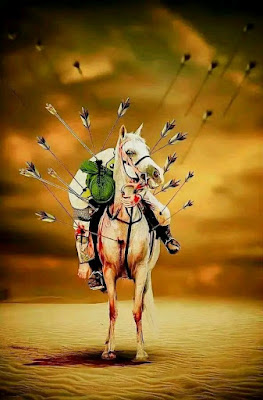The Tragedy of Karbala: The Bravery of Imam Hussain (A.S.) Against Yazid’s Army
The plains of Karbala, scorched by the sun and stained with sacrifice, witnessed one of the most heart-wrenching and heroic events in Islamic history. It was not merely a battle—it was a stand, a declaration that truth can never be silenced by force. At the center of it all stood a man of unparalleled courage: Imam Hussain ibn Ali (A.S.), the beloved grandson of Prophet Muhammad ﷺ.
Background: A Stand Against Tyranny
After the death of Muawiyah, his son Yazid took power. He was known for his un-Islamic practices, cruelty, and disregard for the teachings of Islam. Yazid demanded allegiance (Bay'ah) from Imam Hussain (A.S.), but Hussain refused. He knew that giving his hand to a tyrant would mean legitimizing injustice.
His reply was clear:
"A man like me can never pledge allegiance to a man like Yazid."
With this stand, Imam Hussain (A.S.) set out from Medina to Mecca, and then towards Kufa, upon the call of the people who had promised support. But Yazid's forces intercepted him and blocked his way at Karbala, near the banks of the Euphrates River.
Arrival at Karbala
On 2nd Muharram 61 A.H., Imam Hussain (A.S.), along with his small group of 72 family members and companions, reached the desert of Karbala. Soon, Yazid’s army, numbering 30,000 to 40,000, surrounded them.
Despite the massive difference in numbers, Imam Hussain (A.S.) never showed fear. His camp was filled with spiritual strength, while Yazid's was filled with worldly power.
The Siege and the Thirst
Yazid’s army, under the command of Umar ibn Saad, cut off the access to water from the family of the Prophet. For three days, the children, women, and even the infants of Hussain's camp suffered extreme thirst under the burning heat of the desert.
Still, Imam Hussain (A.S.) did not surrender.
He sent messages of peace, not war. He gave sermons reminding them of who he was — the grandson of the Prophet — but Yazid’s army had chosen blind obedience over conscience.
The Night Before Ashura
On the night of 9th Muharram, known as the Night of Ashura, Imam Hussain (A.S.) gathered his followers and gave them a choice:
“You are free to leave. They want only me. Take this opportunity and save yourselves.”
But not a single soul left. His companions, including the old, the young, and even slaves who had been freed, said:
“Even if we are killed a thousand times, we will never leave you, O Hussain!”
The Day of Ashura (10th Muharram)
The dawn of Ashura rose with the cries of thirsty children and the prayers of the brave. One by one, the warriors of Hussain’s camp went to the battlefield, fighting fearlessly.
The Bravery of Hussain’s Family and Companions:
-
Ali Akbar (A.S.): The young son of Imam Hussain, resembling the Prophet ﷺ in looks and character, fought like a lion and fell bravely.
-
Qasim ibn Hasan (A.S.): A young boy, barely in his teens, asked for permission to fight and embraced martyrdom.
-
Abbas ibn Ali (A.S.): The standard-bearer of Hussain’s army, known as Bab-ul-Hawaij, went to bring water for the children. He lost both arms but still tried to carry water with his teeth, until he was struck and fell beside the river—he died thirsty.
Each martyr brought a new wave of sorrow, yet Imam Hussain (A.S.) stood firm.
The Final Stand of Imam Hussain (A.S.)
When all companions were martyred, only Imam Hussain remained. Weak from thirst, wounded by arrows, and carrying the pain of seeing his loved ones die, he still mounted his horse with dignity.
He gave his final sermon to Yazid’s army, asking them:
“Have I done any injustice? Am I not the grandson of your Prophet? Why do you shed my blood?”
There was no answer only swords.
Hussain fought alone, surrounded by thousands, yet defeating many. Eventually, he fell from his horse, his body covered with arrows, his forehead wounded, his heart strong.
As he lay on the ground, the enemy dared not come near. But then came Shimr, the most ruthless of Yazid's men. He severed Imam Hussain’s blessed head from his body, marking the cruelest moment in Islamic history.
Aftermath: The Message Did Not Die
The women and children, led by Sayyida Zainab (S.A.), were taken prisoner and marched to Kufa and Damascus. But Zainab (S.A.) turned every court into a pulpit, delivering fearless speeches that exposed Yazid’s tyranny.
Imam Hussain's blood shook the conscience of the Muslim Ummah. Though Yazid ruled for a short while, his name is cursed, while Hussain lives on — in hearts, in tears, in inspiration.
Conclusion: Hussain Lives
The incident of Karbala is not just a story of sacrifice — it’s a lesson for every era. Imam Hussain (A.S.) taught the world that:
“Death with dignity is better than life with humiliation.”
He showed that even with 72 against thousands, truth can never be defeated.
Today, his bravery is remembered not with weapons, but with tears, prayers, and action. Whenever someone stands against oppression, speaks truth to power, or defends the innocent that is the spirit of Hussain rising again.


.jpeg)
.jpeg)

.jpeg)

Comments